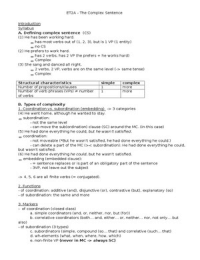Resume
Summary Engels Taalkunde 2: Complex Sentence
- Cours
- Engels Taalkunde 2
- Établissement
- Katholieke Universiteit Leuven (KU Leuven)
Gestructureerde samenvatting met essentiële informatie per behandeld hoofdstuk. Bevat informatie over het examen. Heeft al meerdere medestudenten geholpen om te slagen voor hun (her)examen.
[Montrer plus]



